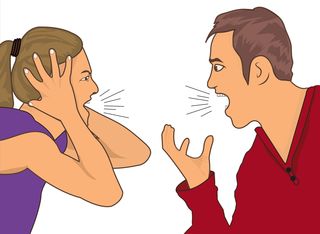Narcissism
Will It Help to Abuse My Narcissistic Mate Right Back?
When you fight fire with fire, you both get burnt.
Posted July 13, 2019 Reviewed by Gary Drevitch

Many people who end up in an emotionally abusive relationship with someone who has narcissistic personality disorder are not prepared to deal with the level of anger and misplaced blame that is directed at them. When you lack adequate tools for countering this type of attack, or nothing you try seems to work, you might eventually decide to fight fire with fire and use your narcissistic mate’s weapons against him or her.
You may reason: They feel free to blame and blast me. Maybe if I give them a dose of their own medicine, this craziness will stop.
This usually happens as a last resort, if you do not have a narcissistic personality disorder yourself. Unfortunately, this tactic rarely works. Instead of backing off and treating you better, most people with narcissistic personality disorder respond by escalating their abusive behavior. The fighting intensifies and gets even uglier. Now there are two of you being mean, instead of just one. And, in my experience, the narcissistic mate usually wins because he or she is willing to do almost anything to keep the upper hand.
In addition, when they feel attacked, narcissists usually conveniently forget whatever they did to provoke you. They are likely to interpret your retaliatory actions as justification for any nasty thing that they want to do to you. This may include portraying you as the real abuser to friends and family and painting themselves as the innocent victim.
(Note: I am using the term “narcissist” and “narcissistic” as shorthand for someone who qualifies for a diagnosis of narcissistic personality disorder.)
How did this miserable, no-win situation come about? Most people go through a fairly predictable set of stages when they find themselves in this type of relationship:
Stage 1: Shock and Denial
The Beginning. Everything has been going well and then your narcissistic mate takes offense at something trivial that other people would probably not even notice. It could be as small as a word you used or your tone of voice. All of a sudden, you find yourself in the middle of a fight.
The Blaming. Anything that you say or do that is meant to calm the situation and explain that you did not intend to hurt your mate’s feelings is taken as further evidence of your culpability. You literally cannot win unless you get on your hands and knees and beg for forgiveness—and that is certainly not winning.
The Denial. Even stranger is that whatever you said or did was in response to something outrageous that your mate said or did. However, narcissists do not tend to recognize their role in creating and perpetuating this type of fight. Your mate could be screaming abuse at you and, if you finally raise your voice and say, “Please stop,” all he or she processes is that you raised your voice: “How dare you!” All of this is now portrayed as entirely your fault.
Your Response. Some people recognize this as emotional abuse and end the relationship right here.
If you stayed, you probably did so because you did not really understand how bad this relationship would get. Yes, you were shocked and dismayed, but you were probably also somewhat in denial as well. You cannot understand why this is happening and you want everything to go back to the way it was when it was good. So you focus on all the good parts of the relationship and tell yourself that your mate was just in a bad mood and that something like this will not happen again.
Stage 2: Frequent Fights
Now the ratio of good times to bad times has drastically shifted. Your mate is constantly criticizing you. If you try to defend yourself, he or she accuses you of being argumentative. You are now blamed for literally everything that goes wrong in your mate’s life.
If your mate has a bad day at work, it is all your fault for wanting both of you to stay up and watch the awards show last night. If your mate is depressed that the house is messy, instead of suggesting the two of you spend some time cleaning up, it is somehow your fault and your responsibility. You left dishes in the sink. Never mind that his or her dirty clothes are all over the living room.
Stage 3: Punishments
Now you are identified you as the enemy. You are no longer simply a “clueless idiot,” you are now “a crazy, vicious, malicious bitch (or bastard)." Your once loving mate now feels entitled to punish you.
The punishments can be anything from walking away from you on the street, humiliating you in public, threatening to throw you out of the car and make you walk home, or refusing at the last minute to go with you to your cousin’s wedding.
If they are the physically abusive type, you may get a cup of coffee thrown at your head. Or, they may escalate the abuse and start to slap, shove, or punch you when they feel annoyed with you.
Warning: Once physical abuse starts, it is likely to continue. They will try and blame you for provoking them. Get out before you get seriously hurt.
Stage 4: Acting Like Them
If you are still sticking it out, you may feel quite justified in doing right back to them everything that they do to you. They rage. You rage. They blame you for their issues and mistakes. You fight back by blaming them.
You have not really picked upnarcissistic traits, but you are using typically narcissistic coping mechanisms to try and deal with the situation.
But if retaliating does not help, what does?
The only thing that really works is to get out of the relationship and not look back. Narcissistic personality disorder does not get better on its own. There are effective therapies, but they take years of serious work with a therapist well trained in the diagnosis and treatment of narcissistic disorders. Your mate would have to spend years in therapy before you saw any serious, consistent improvement in their behavior. And most narcissists refuse to go for psychotherapy in the first place, or if they do, they leave after a few sessions.
Sometimes, just when you have had enough and are ready to leave, your narcissistic mate may suddenly start to behave better toward you. He or she may say: “I’ve come to my senses. I realize that I love you. It is all my fault. I will do anything to make it better. Please stay.” It can be very sweet to hear this after all the abuse and ugliness. Unfortunately, no matter what is promised, it does not change the basic fact that without intensive therapy, the abusive pattern will repeat itself again and again.
Punchline
The harsh reality is that If your abusive mate has narcissistic personality disorder, there is very little you can do that will change the relationship for the better. Being extra nice will not help in the long run. Neither will being mean. Being in a relationship with someone who is extremely narcissistic generally ends with the non-narcissistic person feeling abused, lonely, insecure, and disheartened.




